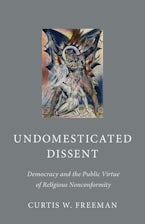This is a groundbreaking book in Baptist studies, bringing new perspectives as the author sets Baptist life in the wider context of dissent, both past and present. He admirably succeeds in distilling a great deal of learned commentary on traditions of dissent into a flowing argument which grips the reader’s interest and provokes thought about Baptist dissenting identity in the modern world. The book itself, like its subject matter, has the character of a prophetic word.
~Paul S. Fiddes, Professor of Systematic Theology, University of Oxford
In this eloquent and timely book, Curtis Freeman reminds us that protecting the right to dissent is both a civic and sacred duty. Freeman traces the roots of certain traditions of dissent, with a particular focus on the work and witness of John Bunyan, Daniel Defoe and William Blake. He rightly argues that commitments to protect the right to protest against prevailing secular and religious orders have not only admirably respected liberty of conscience, they have also strengthened the institutions of church and state. All who care about the health of nations and the integrity of faith will want to read this important book.
~Melissa Rogers, Nonresident Senior Fellow, Brookings Institution
A lively and captivating study of seventeenth-century nonconformity and its afterlives, Undomesticated Dissent attends foremost to the creative power of dissent in theology, politics, and fiction, as well as its import to communities of resistance across the globe. Refusing to surrender diverse nonconformist projects to the past, Freeman looks forward to their postapocalyptic future, urging readers to reconsider the history as well as the ongoing work of dissent. This is an ambitious and important book that offers a vital alternative political imaginary.
~Russ Leo, Assistant Professor of English, Princeton University
Protestant Dissent has been a powerful countercurrent within English-speaking culture, but it is often poorly understood. Curtis Freeman illuminates the tradition through absorbing case studies of three iconic writers: John Bunyan, Daniel Defoe, and William Blake. Each study explores their sources, their most famous text-- Pilgrim’s Progress, Robinson Crusoe, and Jerusalem--and their reception. Weaving together history, literature, and theology, this book offers a rich account of an important subject. It makes a compelling case for rediscovering dissent as a living tradition.
~John Coffey, Professor of Early Modern History, University of Leicester
Notwithstanding the thorough scholarship that undergirds this book the text is unfailingly accessible and engaging--perhaps one of my most enjoyable reads this year.
~John E. Colwell, Regent's Reviews
Curtis Freeman's Undomesticated Dissent is a timely read for Christians of all stripes, not just Baptists and their kin, who are its main audience. It raises fundamental questions about the role of opposition in how we conceive of Christianity, and that is exactly the reason you should read it and discuss it with your friends who care about the unity of the church.
~Lori Branch, Commentary Magazine
Curtis Freeman has written a book as unexpected as it is timely...This book is creative and constructive, instructive and inspiring. It is a book that cannot be merely read but lived.
~Spencer Boersma, Reading Religion
When one chooses a topic that is centered around nonconformity, anarchism, resistance, symbolism, and subversion, one runs the risk of a disordered narrative, but also gains the possibility of breaking new ground, of taking the reader into new lands, or new depths. This is the cost-benefit dilemma that Curtis W. Freeman embraces in Undomesticated Dissent, as he presses the tradition of religious dissent in England in the seventeenth and eighteenth centuries (and beyond), and offers his provocative and passionate reading of several provocative and passionate writers.
~Michael R. Stevens, Journal of Markets & Morality
Freeman’s compelling narrative bears out the complexity of a religious phenomenon characterized more by existential fortitude and a willingness to challenge authority than a set of fixed principles or doctrines.
~J. Scott Jackson, The Christian Century
Illuminating and thought provoking in its sweeping view of the nonconformist tradition.
~Ian Birch, Baptist Union of Scotland
Well written and rigorously researched, this text would be a trusted and engaging companion to Reformation and early modern primary sources in seminary and graduate theology programs, particularly those that cultivate interdisciplinary ties with the fields of history, literature, and political science.
~Margaret R. Pfeil, Horizons: The Journal of the College Theology Society
With deep scholarship and a wide enough lens to follow his sources and not confine them to his vision, Freeman is an expert guide. His laying out of a masterful narrative of Dissent and its present possibilities in our pluralized political order is a commendable success.
~Andy Draycott, Bunyan Studies
With its careful concern to introduce and explicate the most significant political and historical debates surrounding early modern cultures of dissent, and to provide summaries of plot and character to aid readers in engaging Bunyan's and Blake's complex allegory, this new, highly accessible book can serve as a counterpart to those anthologies, and as a model for sensitive reading of such sources. Such work enables a conversation of great scope which crosses literary and theological disciplinary boundaries.
~Emma Salgard Cunha, Scottish Journal of Theology
Freeman, in this book, brings to the fore the fact that dissent is crucial to establishing democracy and essential in nurturing it. Buried deep in their full narrative of religion and resistance, Bunyan, Defoe and Blake together declare that dissent is not disloyalty, and that democracy depends on dissent.
~Michael Sebastian Aidoo, Journal of European Baptist Studies

